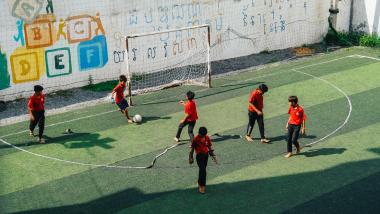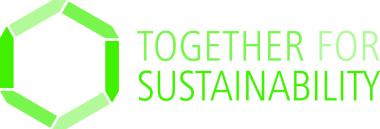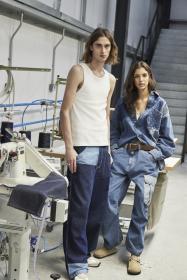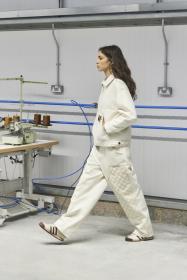adidas: reports 2nd Q revenues flat versus the prior year
- Currency-neutral revenues flat versus the prior-year level
- Top-line development reflects improved sell-out trends and conservative sell-in strategy
- Gross margin up 0.6pp to 50.9%; strong improvement compared to Q1 reflecting better sell-through and less discounting
- Operating profit of € 176 million includes extraordinary expenses of around € 160 million related to one-off costs, donations and accruals for future donations
- Inventory position improves substantially versus Q1 level to € 5.5 billion; now up only 1% year-over-year
In the second quarter of 2023, currency-neutral revenues were flat versus the prior-year level. The top-line development continued to be impacted by the company’s conservative sell-in approach in order to reduce high inventory levels, particularly in North America and Greater China. At the same time, adidas second quarter revenues benefited from the first sale of some of its Yeezy inventory. The initial product drop in June generated revenues of around € 400 million in Q2, which is largely in line with the Yeezy sales generated in the prior year’s quarter.
Footwear revenues grew 1% during the quarter, reflecting strong growth in football, basketball, tennis and US sports. Apparel sales declined 3% in the second quarter. As the apparel market continues to be particularly overstocked, the company continued its conservative sell-in strategy to improve sell-through and margins in the medium term. Accessories grew 8% during the quarter driven by growth in football.
Lifestyle revenues were down during the quarter despite extraordinary demand for the company’s Samba, Gazelle and Campus franchises. While adidas slowly started to scale its offering for these product families during the second quarter, the total volume still only represents a small portion of the company’s overall business. Sales in the adidas Performance categories continued to show positive momentum. This reflects strong demand for new product introductions such as the latest iterations of its Predator, X and Copa football boots, as well as jerseys for both the FIFA Women’s World Cup 2023 and the company’s unique portfolio of football teams ahead of the start of the European club season. In addition, the Adizero product family in running continued to gain a lot of attention around marathon races across the world, translating into higher demand. At the same time, the brand’s Barricade tennis franchise grew strongly, leveraging the excitement around major tournaments.
In euro terms, the company’s revenues declined 5% to € 5.343 billion in the second quarter (2022: € 5.596 billion).
Stronger sell-out trends and conservative sell-in
As a result of the company’s initiatives to reduce high inventory levels, currency-neutral sales in wholesale declined 10% despite double-digit growth in Greater China and Latin America. At the same time, direct-to-consumer (DTC) revenues grew 16% versus the prior year. This development was driven by strong growth in both the company’s e-commerce business (+14%) as well as own retail stores (+19%), reflecting continued strong sell-out trends across most regions. The outperformance of the company’s DTC channel versus the wholesale business was also related to the first sale of the Yeezy inventory, which was done exclusively through adidas’ own e-commerce channel.
Double-digit growth in Greater China and Latin America
Currency-neutral sales in North America declined 16% during the quarter. The region is particularly affected by elevated inventory levels in the market and – in response to this – the company’s significantly reduced sell-in. Revenues in Greater China grew 16% in Q2, reflecting double-digit sell-out growth in both wholesale and own retail. Sales in EMEA were down slightly (-1%) despite double-digit DTC growth. While the company’s initiatives to reduce inventory levels and discounting weighed on the overall top-line development in the region, adidas recorded significantly improving full-price trends during the quarter. Revenues in Asia-Pacific increased 7% during the quarter, driven by strong double-digit growth in DTC. Latin America continued to increase at a double-digit rate (+30%), reflecting strong growth in both wholesale and DTC.
Gross margin improves to 50.9%
The company’s second quarter gross margin increased 0.6 percentage points to 50.9% (2022: 50.3%). This improvement was mainly driven by price increases the company has implemented as well as by an improved channel mix. At the same time, higher supply chain costs and unfavorable currency movements continued to strongly weigh on the gross margin development. While still adversely impacting the company’s gross margin in the quarter, discounting levels significantly improved compared to the first quarter of the year.
Operating profit of € 176 million, resulting in an operating margin of 3.3%
Other operating expenses were up 3% to € 2.582 billion (2022: € 2.501 billion). As a percentage of sales, other operating expenses increased 3.6 percentage points to 48.3% (2022: 44.7%). Marketing and point-of-sale expenses decreased 7% to € 617 million (2022: € 663 million). As a percentage of sales, marketing and point-of-sale expenses slightly decreased by 0.3 percentage points to 11.5% (2022: 11.8%). Operating overhead expenses were up 7% to € 1.965 billion (2022: € 1.838 billion), reflecting higher logistics expenses. In addition, the company recorded one-off costs of around € 50 million related to the strategic review the company is currently conducting as well as donations and accruals for further donations in an amount of around € 110 million. As a percentage of sales, operating overhead expenses increased 3.9 percentage points to 36.8% (2022: 32.8%). The company’s operating profit amounted to € 176 million (2022: € 392 million) in the quarter. This amount includes the extraordinary expenses of in total around € 160 million reflecting the one-off costs related to the strategic review as well as the donations and accruals for further donations. The sale of the Yeezy product positively impacted adidas’ operating profit by an incremental amount of around € 150 million in Q2. The operating margin reached 3.3% in the quarter (2022: 7.0%).
Net income from continuing operations of € 96 million
After taxes, the company’s net income from continuing operations amounted to € 96 million (2022: € 360 million), while basic EPS from continuing operations decreased to € 0.48 (2022: € 1.88).
Outlook
adidas expects revenues to decline at a mid-single-digit rate
On July 24, adidas had adjusted its full year financial guidance to reflect the positive impact of the first sale of some of its Yeezy inventory and a slightly better-than-expected development of the adidas business in the first half of the year. At the same time, macroeconomic challenges and geopolitical tensions persist. Elevated recession risks in North America and Europe as well as uncertainty around the recovery in Greater China continue to exist. In addition, the company’s revenue development will continue to be impacted by the initiatives to significantly reduce high inventory levels. As a result, adidas now expects currency-neutral revenues to decline at a mid-single-digit rate in 2023 (previously: decline at a high-single-digit rate).
Underlying operating profit anticipated to be around the break-even level
The company’s underlying operating profit – excluding any one-offs related to Yeezy and the ongoing strategic review – is still anticipated to be around the break-even level. Including the positive impact from the first Yeezy drop of around € 150 million, the potential write-off of the remaining Yeezy inventory of now € 400 million (previously: € 500 million) and one-off costs related to the strategic review of up to € 200 million (unchanged), the company now expects to report an operating loss of € 450 million in 2023 (previously: loss of € 700 million).
On August 2, the company launched a second drop of Yeezy inventory. Throughout the month of August, adidas is making a range of existing products available through both its own e-commerce channel as well as the digital platforms of selected wholesale partners. If successful, this second drop would further improve the company’s results. However, as the results of this drop are yet unknown, it is not accounted for in the company’s current top- and bottom-line outlook for 2023.
adidas





























